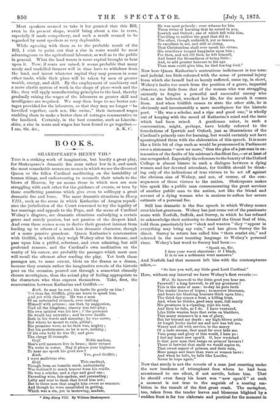THE AGRICULTURAL HOLDINGS BILL. [TO THE EDITOR OF THE "SPECTATOR:'
reading through the debate on the Agricultural Holdings Bill, I was grieved to find that no speaker touched on the pro- bable results of that or a similar Bill, if universally adopted, whether by agreement or compulsion, on the position of the agricultural labourer. With your permission I should like to say a few words on this aspect of the question. Most speakers seemed to take it for granted that this Bill, even in its present shape, would bring about a rise in rents, especially if made compulsory, and such a result seemed to be regarded by most speakers as very deplorable.
While agreeing with them as to the probable result of the Bill, I wish to point out that a rise in rents would be most advantageous to the agricultural labourer, as well as to the public in general. What the land wants is more capital brought to bear upon it. Now, if rents are raised, it seems probable that many needy and unskilled farmers will in time have to withdraw from the land, and invest whatever capital they may possess in some other trade, while their place will be taken by men of greater wealth, energy, and skill. By the employment of machinery and a more elastic system of work in the shape of piece-work and the like, they will apply manufacturing principles to the land, thereby gradually raising the wages of the labourers as greater skill and intelligence are required. We may then hope to see better cot- tages provided for the labourers, so that they may no longer "be hovelled together, each sex, like swine," their increased wages enabling them to make a better class of cottages remunerative to the landlord. Certainly, in the best counties, such as Lincoln- shire, a rise in rents and wages has been found to go together.—



































 Previous page
Previous page